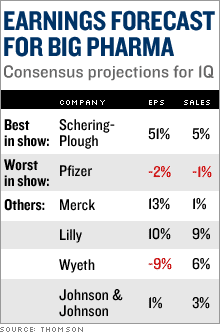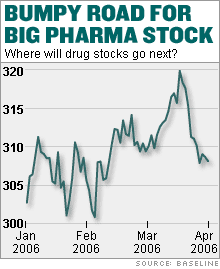|
Big Pharma stocks: A bumpy rise
Merck looks forward to strong 1Q earnings; Pfizer's forecast is flat. Analysts say the industry has room to grow.
NEW YORK (CNNMoney.com) - Big Pharma stocks have had a decent year and analysts say they're poised to climb higher. But investors will have to be able to stomach some uncertainty. Merck (up $0.09 to $33.94, Research) has seen its stock price climb 3.4 percent this year, while Pfizer's (up $0.16 to $24.58, Research) stock has increased 2.7 percent. By comparison, the S&P 500 rose 1.5% year to date. Overall, drug stocks have risen 1.8 percent this year through April 5, according to the most recent numbers available through Baseline, a Thomson financial database, and prices have dropped since.
"Pfizer and Merck had huge moves up in December, so the fact that they're still up year-to-year is pretty impressive," said Jami Rubin, an analyst for Morgan Stanley. Still, drug stock prices have slid in recent weeks following a February peak. And as they get ready to unveil first-quarter earnings starting next week, many drug companies find themselves with stock prices that analysts consider to be discounted, with room to grow. "I think they're relatively cheap," said Jon LeCroy, analyst for Natexis Bleichroeder. "What we saw was a big run-up toward April, and now we're seeing a little more profit-taking." The most serious problems facing the drug companies tend to be well-known and priced into the stock. Although each of the big drug companies faces its own set of strengths and weaknesses, the biggest obstacle facing the industry at large is pipeline malaise, analysts say. As earnings are released, investors will soon face concrete numbers that will push them to buy up or jettison drug stocks. Schering-Plough (down $0.23 to $18.32, Research), Merck and Eli Lilly & Co. (down $0.27 to $53.15, Research) have garnered the most bullish consensus projections for first-quarter earnings, while Pfizer, Wyeth (down $0.56 to $46.14, Research) and Johnson & Johnson (up $0.02 to $57.89, Research) have brought in weaker forecasts. "Expectations are fairly low, and these companies will deliver results that are in-line, or slightly better than expectations," said Barbara Ryan, analyst for Deutsche Bank North America. Big Pharma has gotten so beaten up in recent years that it probably won't take much to impress analysts. Here's a look at the two largest drug makers: Merck's bad news "baked into the cake"
Merck, the second-biggest U.S. drug maker, is facing nearly 10,000 lawsuits over its former blockbuster arthritis painkiller Vioxx, which was pulled from the market because of heart risks in 2004. Also, Merck's No. 1 earner, the cholesterol-cutting Zocor with $4.4 billion in 2005 revenues, loses patent protection in June, evaporating about 20 percent of company sales. The company's earnings per share are expected to jump 13 percent for the first quarter, with a sales increase of 1 percent. But when Merck loses its Zocor patent protection, will the stock price get hit? Barbara Ryan, analyst for Deutsche Bank North America, said that bad news over Zocor and Vioxx are "baked into the cake," but the good news is not. Ryan said investors are waiting to see if the Food and Drug Administration approves two potential blockbusters: Gardasil, a cervical cancer vaccine, and Januvia, a diabetes treatment. Approval for those drugs could translate into positive moves for the stock. Also, Merck hopes to fill some of the Zocor sales vacuum with the cholesterol drug Vytorin, which combines Zocor with Schering-Plough's Zetia. Launched in 2004, fast-growing Vytorin totaled $2.4 billion in 2005 sales. Pfizer's: flat earnings, but promising pipeline
Pfizer's earnings are expected to be less impressive. The world's biggest drug maker is projected to report a 2 percent drop in earnings per share for the first quarter, with a sales decline of 1 percent, according to Thomson consensus. This year, Pfizer is losing patent protection on Zoloft, the antidepressant with $3.3 billion in 2005 sales, and in 2007 it loses blood pressure treatment Norvasc ($4.7 billion in 2005 sales). Bextra, an arthritis painkiller of the same class as Vioxx, was pulled off the market because of health risks, and the painkiller Celebrex is still sold but sales are dropping. "Pfizer's in the midst of a period of heavy patent expiration," said LeCroy of Natexis Bleichroeder. "They're in a period now, and for the next year or two, of very limited growth." Ryan of Deutsche Bank North America considers Pfizer stock to be "pretty cheap, but not as cheap as they were in the fall." But looking forward, investors might have a reason to buy. Pfizer has two up-and-coming potential blockbusters recently approved by the FDA: Exubera, the inhalable insulin for diabetics, and Sutent, a treatment for stomach and kidney cancer. There's also Indiplon: the sleeping pill that's awaiting regulatory decision. Drug stocks poised for positive news
Some analysts feel that investors have grown so cynical about the drug industry, any good news would boost stock prices. "My overall feeling is that this group has been massively out of favor for the last four years, but we've actually had a lot of good news in the last couple of months that should bring them into favor," said Jami Rubin, analyst for Morgan Stanley. But it might take a while for Big Pharma to completely shed its current raft of problems. Even after pipeline drugs enter the market, it can take years to build up to the billion-dollar sales that investors want to see. "Most of the bad things are happening now, and things do get brighter at the end of the decade," said LeCroy of Natexis Bleichroeder, who expects pipelines to strengthen in 2009. "They are still a lot people on the sidelines who would rather wait and miss a little bit of run-up, but get confirmation [later on] that those stocks are going to strengthen."
To find out how Big Pharma plans to beef up its pipelines, click here. |
|


